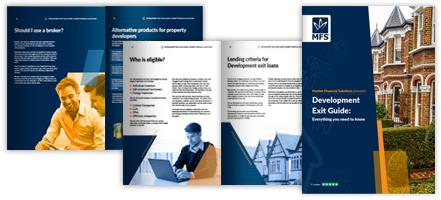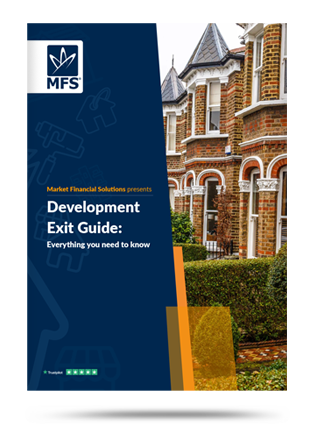
Written by Liza Campion
Head of National Accounts
Market Financial Solutions are a bridging loan and buy-to-let mortgage provider and are not legal, financial, investment or tax advisers. This document is for informational purposes only and does not, and should not be considered, to constitute legal, financial, investment or tax advice or be relied upon by any person to make a legal, financial, investment or tax decision. Therefore, Investors are encouraged to seek appropriate professional advice. The information in this content is correct at time of writing.

We are constantly surrounded by property development projects. From apartments to offices and anything in between, property developers play a major role in creating the world around us. However, if you asked, ‘what is a property developer?’ or ‘what do property developers do?’, a lot of people might struggle to answer.
Therefore, we have pulled together this blog breaking down everything you need to know about property development. We’ll examine the risks involved and the financial options prospective developers have at their disposal.
What is a property developer & what do they do?
So what is a property developer? In short, property developers are individuals who build new properties or refurbish existing houses to sell them on for a profit.
For the most part, developers will choose to focus on a particular area of the property market when developing properties. This could be commercial properties or residential homes, for example.
However, it’s common for these areas of focus to overlap. For example, developers in the residential sector might decide to include more commercial features in their property, such as a shop in a block of flats.
Why work as a property developer?
We have looked at what a property developer is. But, buyers should also focus on why they should invest before looking into how to become a property developer.
Indeed, there are many reasons for choosing to become a property developer. Firstly, there is a chronic undersupply of residential properties in the UK. In fact, estimates place the number of new houses needed to fix the undersupply of homes in the UK at 300,000 a year until 2031.
As such, becoming a property developer will be playing a useful role in solving the housing crisis and going some way to alleviating the worsening affordability crisis. Income wise, the average base salary for a property developer in the UK is just under £40,000 per year, according to Indeed.
Source: Indeed
Property development is a sector open to new entrants, regardless of experience, but there are some skills that would be beneficial to anyone looking to enter the industry.
So what makes a good property developer?
It is beneficial to examine the skills which may be beneficial for those wondering ‘what is a property developer?’ and ‘how do I get into the field?’.
Firstly, property developers need to be creative and be able to think outside of the box. To take a project from its conception through each stage of the process – design, approval, financing, construction, marketing and finally the letting or sale of the project – takes a great deal of proactivity and creativity.
Secondly, being a property developer requires some level of financial skills. In particular, the ability to pull together funds for a project is of the utmost importance. A financially competent mind is also vital when it comes to organising property prices, whether that be for renting or selling.
Thirdly, legal knowledge, particularly of town planning and property laws, is also useful for developers.
Finally, as will be explained below, there is a long list of people developers will need to coordinate with to make their development a success. As such, project management and team leading skills are essential.
Of course, any property project will also need a healthy dose of patience and hard work.

What projects would a property developer work on and how do they add value to property and land?
What do property developers do? There are many kinds of projects a property developer could work on, and each one can add value to the land or property in a different way.
For example, a developer may renovate, redecorate or extend an existing property, adding value by improving the property’s overall features. In particular, this kind of project works best for older, run-down properties which can then be resold at a profit or used as a buy to let property.
Alternatively, a developer might purchase undeveloped land and choose to build residential or commercial property on it, adding value by renting or selling the new building. They could also refinance the land, regaining the money they initially invested with the added value the new property would draw.
Moreover, property conversions are another way of adding value to a property. For instance, a large house could be converted into a host of flats, increasing the number of properties that could be sold or rented out. This could also occur in previous commercial properties like office buildings.
Finally, a developer might take steps to buy the land of a certain property and knock it down in place of a new development. As such, previously unsafe or ugly buildings could be knocked down in place of a new, more valuable property.
Who would a property developer work with?
Understanding what a property developer is involves recognising the need for a range of skills. To be successful, prospective developers could look to organise a team of the following people to help design, manage and coordinate the process, depending on their own skills and weaknesses.
- Planning Consultant
- To help the planning process and planning permission applications
- Architect
- In charge of designing the development and planning its construction
- CGI Company
- Turns the architects’ ideas, exteriorly and interiorly, into a visual representation of the development
- Quantity Surveyor
- A key member of the team, quantity surveyors will calculate the costs of the project and the materials needed to complete it
- Contractors
- From builders to plumbers, they carry out the work according to the plans of the architect
- Accountant
- Ensures efficient practices by analysing financial reports, tax returns and budgets
- Solicitor
- In charge of providing legal advice. Also helps with the sale of the project
- Professional snagging company
- Once complete, they will check the development for any faults before it goes to market
- Cleaning company
- Cleans the property ready for sale or lease
- Estate Agent
- Arranges viewings and offers from potential buyers or tenants, as well as the marketing of the project
As shown by this long list, project management and team coordination are vital skills for potential developers.
Is it risky?
When considering how to get into property development, checking whether it is risky is a must. Indeed, there are some inherent risks, especially when prices are intrinsically linked to demand.
For example, increases in interest rates can precipitate a rise in holding expenses. As such, there is a danger that a developer takes out a loan when rates are low and can no longer fulfil their commitments if rates rise before they can pay the loans back.
Another possible increase is the price of construction, which can be determined by the cost of labour or materials. This poses a further risk to a developer’s budget.
Finally, a downturn in the property market poses a huge potential risk for developers. The cyclical nature of the market means whilst it might have been thriving at the start of the project, economic instability could have caused prices to depress or fall.
What funding is available to a property developer?
These days the financial market is swamped with different types of loans and financial products. So, when considering how to get into property development, it is worth being aware of the funding available.
- Bridging loans
- A bridging loan is a form of alternative finance that provides property investors with fast and flexible funding for their residential and commercial investments. These short-term loans help to bridge the gap between payments and developers could use them to buy properties or finance renovations.
- Read about Market Financial Solutions’ bridging loan rates.
- Secured and unsecured loans
- Secured loans allow developers to borrow money while using their home as ‘security’, which a lender can then sell if the developer cannot pay them back
- An unsecured loan is similar but doesn’t use the property as collateral.
- Usually these loans have much higher interest rates and missed payments could incur additional charges or damage the developers credit score
- Development exit loans
- Development exit loans are a short-term bridging loan solution for property developers, used to repay a development finance loan.
- This bespoke bridging product provides property developers with the breathing space to find buyers or finish minor development works, such as internal refurbishments without incurring costly penalties from the development lender for late payment.
- Read about Market Financial Solutions’ development exit products.
How property developers can use bridging finance to their advantage
Developers can use such finance products to their advantage. For example, developers can repay their loans in stages as each unit of a major development project sells, giving them more control over their finances.
Moreover, bridging loans give developers the time and space to find buyers or acquire a longer-term financial solution.
Similarly, developers can wait for the right kind of buyer, removing the need to reduce property prices and lose money. With a bridging loan, there will be less rush to find a buyer in order to meet a deadline.
Finally, there is no need to pay expensive developer finance extension costs, Developers can simply take out another loan to avoid extending their initial financial option.
Here at Market Financial Solutions, we pride ourselves on our ability to help developers and their brokers to make the most of these bridging loan advantages.To find out more about our products and expertise, head to our website.
Development Exit Finance
A complete guide
Everything you need to know
- Benefits & costs
- Difference to development finance
- Application & loan process
- Repayment options





